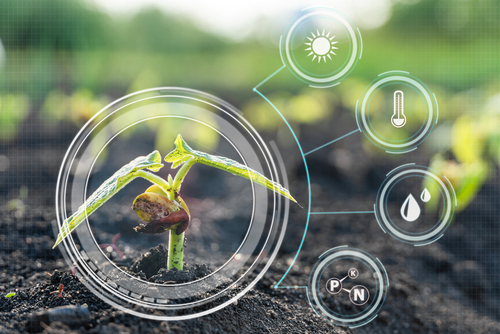How AI Innovations Are Transforming the Agricultural World
April 8, 2024 7:22 pm Leave your thoughts
Artificial Intelligence (AI) innovations have begun to revolutionize the agricultural world, shaping the future of farming and transforming the way food is produced. Recent articles and studies have highlighted the significant impact of AI technologies on the agricultural industry, from improving efficiency and productivity to enhancing sustainability and reducing environmental impact. In this blog post, we will explore how AI innovations are changing the agricultural landscape, why they are crucial for the future of farming, and some of the expectations and implementations of these transformative technologies.
Enhancing Efficiency and Productivity
AI technologies are helping farmers increase efficiency and productivity by providing smart solutions for various aspects of farming operations. AI-powered drones and robots can be used to monitor and manage crops, detect pests and diseases, and apply fertilizers and pesticides with precision. These technologies allow farmers to optimize resource use, reduce labor costs, and make data-driven decisions to improve crop yields. By leveraging AI innovations, farmers can streamline agricultural processes, increase output, and maximize profitability.
Improving Sustainability and Environmental Impact
In addition to enhancing efficiency and productivity, AI innovations are playing a crucial role in promoting sustainability and reducing the environmental impact of agriculture. AI-powered systems can analyze environmental data, weather patterns, soil conditions, and crop health to optimize farming practices and minimize resource waste. By using AI to make informed decisions about irrigation, fertilization, and pest control, farmers can reduce water usage, chemical inputs, and greenhouse gas emissions, leading to a more sustainable and environmentally friendly agriculture sector.
Implementing Precision Agriculture Techniques
One of the key applications of AI in agriculture is precision farming, which involves using data-driven technologies to monitor and manage field variability in real-time. AI algorithms can process large amounts of data from sensors, satellites, and drones to create detailed maps of soil characteristics, moisture levels, and crop health. This information allows farmers to customize inputs, such as water, nutrients, and chemicals, to match the specific needs of different areas within a field, optimizing crop growth and minimizing waste. Precision agriculture techniques enabled by AI are transforming farming practices and driving efficiencies across the entire food production chain.
Facilitating Predictive Analytics and Decision-Making
AI technologies are also enabling predictive analytics and decision-making in agriculture, helping farmers anticipate and respond to changing conditions in their fields. Machine learning algorithms can analyze historical data, weather forecasts, and crop models to predict yield outcomes, disease outbreaks, and pest infestations. By providing actionable insights and recommendations, AI empowers farmers to make informed decisions in real-time, such as adjusting planting schedules, applying treatments, or implementing interventions to mitigate risks and maximize returns. Predictive analytics powered by AI are reshaping the way farmers manage their operations and adapt to dynamic and uncertain agricultural environments.
Advancing Crop Breeding and Genetic Improvement
AI innovations are driving advancements in crop breeding and genetic improvement, accelerating the development of more resilient, productive, and sustainable plant varieties. AI algorithms can analyze genetic data, phenotypic traits, and environmental factors to identify desirable traits, predict trait combinations, and optimize breeding programs. Through machine learning and genomics, researchers can speed up the breeding process, select superior cultivars, and develop crops that are better suited to changing climate conditions, pests, and diseases. AI-driven crop breeding techniques hold immense potential for enhancing food security, biodiversity, and resilience in agricultural systems.
Enhancing Supply Chain Management and Traceability
AI technologies are transforming supply chain management and traceability in the agricultural sector, improving transparency, efficiency, and accountability from farm to fork. AI-powered systems can track and trace food products throughout the entire supply chain, from production and processing to distribution and retail. By collecting and analyzing data on origin, quality, and safety, AI solutions enable stakeholders to ensure product integrity, authenticity, and compliance with food safety standards. Enhanced supply chain management and traceability facilitated by AI are creating opportunities for increased food safety, sustainability, and consumer trust in agricultural products.
Expectations and Future Implementations of AI in Agriculture
As AI technologies continue to evolve and mature, the agricultural industry can expect to see further advancements and applications in the near future. Some of the anticipated developments include the integration of AI with Internet of Things (IoT) devices for real-time monitoring and control of farm operations, the use of autonomous vehicles and machinery for automated field tasks, and the deployment of AI-powered predictive models for climate risk assessment and yield forecasting. Furthermore, the adoption of AI-driven solutions for addressing global challenges, such as climate change, food security, and sustainability, is expected to increase, driving innovation and transformation in agricultural practices worldwide.
Summary
AI innovations are proving to be a game changer in the agricultural world, offering unprecedented opportunities for enhancing efficiency, sustainability, and productivity in food production. By leveraging AI technologies, farmers can optimize farming practices, improve decision-making, and address critical challenges facing the agriculture sector. The expectations and implementations of AI in agriculture are vast and diverse, ranging from precision farming and predictive analytics to crop breeding and supply chain management. As AI continues to shape the future of farming, it is essential for the agricultural industry to embrace these transformative technologies and unlock their full potential for creating a more sustainable, resilient, and productive food system.
Need Cotton Mill & Cotton Gin Components in Lubbock, TX?
Welcome to M.B. McKee Company, Inc. M.B. McKee Company, Inc. has been serving our local community of Lubbock since 1943. Locally owned and family operated, we provide great customer service and solutions for ongoing issues. With over 70 years of experience, our products, services, and engineering will always exceed your expectations. Our products include bearings, belts, chains, conveyor systems, gearing, lifts, motors, drives, product separation, tools, valves, and fittings. Our engineering division also provides general formulas, NEMA motor frames, elevator legs, screw and belt conveyors, lift charts, components from Baldor and Flexco, and various interchangeable parts. Contact us today to learn more about what we can do for you!
Categorised in: AI
This post was written by admin

